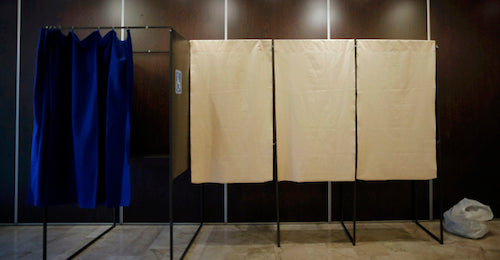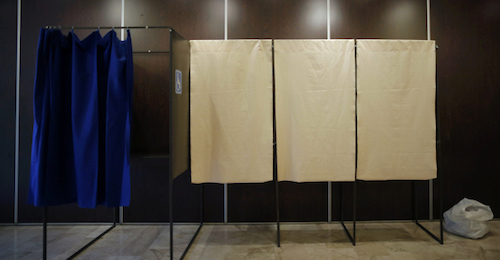Let’s lose interest in elections, once and for all!

This text by Alain Badiou first appeared on the Mediapart blog. Translated by David Broder.
I understand the bitterness of those remonstrating after the first round of the elections, particularly those left disappointed by Mélenchonism. That said, whatever they do, or say, there was no particular aberration, no swindle, in this vote.
In fact, there were but two anomalies of parties, which have sadly (for the actually-existing powers) decomposed the central parliamentary bloc. This bloc is composed of the classic Left and Right. For forty years — or even two centuries — this bloc has backed the roll-out of the local capitalism. Yet the outgoing local representative of the so-called Left, Hollande, did not stand again, and this broke up his party. On the other hand, there is the classical Right. Thanks to its rather ill-fated primaries it did not choose its best old horse, Alain Juppé, but a provincial bourgeois of sorry countenance, too remote from the "societal" delights of modern capitalism.
The "normal" second round would have been Hollande vs. Juppé, or at worst Le Pen vs. Juppé, with Juppé easily winning in either case. In the absence of the two decomposed parties of government, our true masters for two centuries — the owners and managers of capital — were struggling a little. Fortunately (for them), together with their usual political personnel, the old veterans of reaction and of course the aid of the residues of social democracy (Valls, Le Drian, Ségolène Royal and company) they cobbled together a presentable substitute for a central parliamentary bloc that was dying without heirs. And that substitute was Emmanuel Macron. Very usefully, and very importantly for the future, they also rallied François Bayrou to their cause — that experienced old centrist sage, the man of all electoral wars, including the most difficult. All this was done with some panache, and in record time. Ultimate success was practically guaranteed.
In these conditions — which are entirely possible to explain — the vote confirmed more clearly than usual that the pro-capitalist and rightist subjectivity, including in its rather fascistoid forms, has an absolute majority in the country.
Part of the intellectuals and part of the youth refuse to see this, or bitterly regret it. But what is this? Do these lovers of democratic elections want someone to change who the people voting are, like you change a dirty shirt? Those who vote must consent to the majority wish, all the same! In truth, these two groups measure the world by the yardstick of their own situation and their own dreams, without drawing the necessary conclusion: that there is absolutely nothing to expect from the word "democratic."
Already in 1850 Napoleon III saw that universal suffrage was not the horror that the bien-pensant bourgeoisie had imagined it to be, but a true blessing, an unexpected and precious legitimation of reactionary powers. That is still true today, everywhere around the world. Napoleon’s heir had understood that in more or less normal and stable historical conditions, the bulk of numbers is always fundamentally conservative.
Let us conclude with some calm. Hysterically working up election results leads to nothing but a worthless depression. Let us get used to it: there will never be a deathblow against our present servitude without — and this is as far as things could be from electoral rituals — the historic tying-together of four factors:
1) A situation of historic instability, which overwhelms conservative subjectivities. Alas, such a situation would very probably be a war, as was the case for the Paris Commune in 1871, the Russian Revolution in 1917 and the Chinese Revolution between 1937 and 1947.
2) A strongly established ideological division — naturally, first of all among intellectuals, but ultimately among the broad masses themselves — over the fact that there are two paths and not just one. Over the fact that the whole space of political thinking must structure itself around the antagonistic contradiction between capitalism and communism, or this or that of the equivalents of this contradiction. In passing I will remind readers of the principles of this second path: the establishment of collective forms of managing the means of production, credit and exchange, as against private property; the polymorphism of labour, which is especially undermined by the division between its manual and intellectual forms; a consistent internationalism; and forms of popular rule working toward the end of any separate state.
3) A popular rising — certainly, as always, a minority one, but one which does at least set state power in suspense. Such a rising is often linked to point 1.
4) A robust organisation capable of proposing an active synthesis of the three first points, directed at its enemies’ collapse and — as fast as possible — the implementation of the constitutive elements of the second, communist path, such as I mentioned above.
Two of these four points — numbers 1 and 3 — depend on the conjuncture. But we can actively work on point 2 right away. And this is an utterly crucial point. We can also work on point 4, especially by supporting — also in light of point 2 — joint meetings and actions among both a section of the intellectuals and the proletariat in three of its forms: active workers and low-ranking state employees; the working-class families hit hard and demoralised by the frenetic deindustrialisation of France these last three decades; and the nomad proletariat of African, Middle-Eastern or Asian provenance.
Getting hysterical about election results, in a both depressing and declamatory fashion, is not only useless, but harmful. It is to take a position on enemy terrain, helpless and with no solution. We must become indifferent to elections, which at most correspond to a purely tactical choice between abstaining from playing in this "democratic" fiction, or else supporting this or that competitor for conjunctural reasons, which we define precisely within the framework of communist politics, otherwise foreign to the rituals of state power. We must devote our always precious time to our true political toil. And this latter must be inscribed within the four points listed above.
